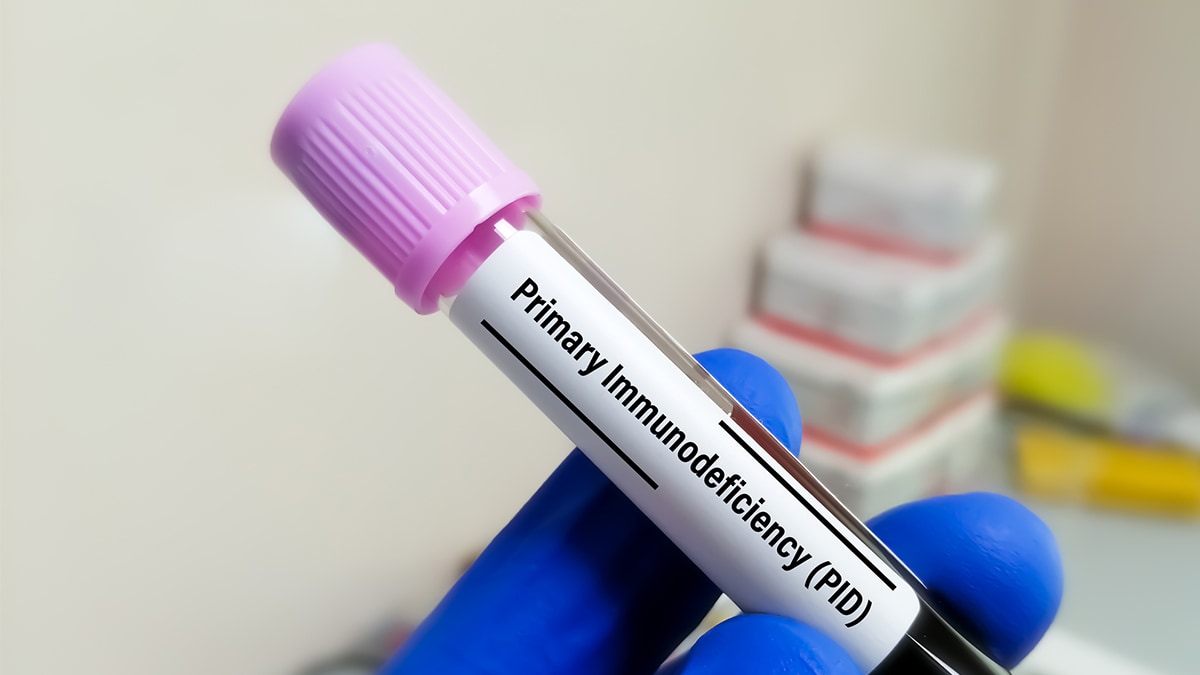Key points
- People with primary immunodeficiency (PI) have an immune system that doesn't work correctly. This makes them more likely to get and become very sick from infections.
- PI often has a genetic cause and runs in families. Tell your healthcare provider if you have a family health history of PI.
- Talk to your healthcare provider if you think you or your child could have PI.
- Finding and treating PI early can prevent or delay some health problems that PI causes.

What it is
Your immune system helps your body fight infections. People with primary immunodeficiency (PI) have an immune system that does not work correctly. This means that people with PI are more likely to get and become very sick from infections.
There are more than 400 types of PI that vary in severity, which affects how early they are detected. In some cases, a person with a mild form may not find out that they have PI until adulthood. In other cases, the disorder causes problems in infancy and is found soon after birth. All states include testing for one type of PI called severe combined immunodeficiency (SCID) as part of newborn screening. Treatments can help the immune system work better. Which treatment works best depends on the type of PI a person has.
Signs and symptoms
People with PI are more likely to have the following:
- More frequent or repeated infections, such as
- Infections that last longer than in most people
- Infections that are hard to treat and do not respond to antibiotics or require IV antibiotics
- Infections that are more severe and require hospitalization, such as sepsis or abscesses (pus-filled infections) of internal organs
- Infections that most people don't get (sometimes called opportunistic infections)
- Lack of weight gain or growth in an infant (failure to thrive)
- Digestive problems, such as chronic diarrhea
Talk to your healthcare provider if you think that you or your child has signs of PI. Your healthcare provider might refer you or your child to a clinical immunologist, a healthcare provider who specializes in the immune system. You can use the American Academy of Allergy, Asthma, and Immunology's Find an Allergist/Immunologist tool to find a healthcare provider near you.
Complications
People with PI are more likely to have autoimmune disorders and certain blood disorders. Because your immune system protects your body against cancer, people with PI are more likely to have certain cancers. In some cases, PI is due to a genetic disorder that involves other health problems, such as 22q11.2 deletion syndrome (also called DiGeorge syndrome)
Family health history
PI often has an underlying genetic cause and can run in families. Sharing your family history of PI with your healthcare provider can be important for your and your children's health or if you are pregnant or planning a pregnancy. If you or your child have been diagnosed with PI, be sure to share this information with your family members. Your healthcare provider might refer you for genetic counseling and testing if you have been diagnosed with PI or have a family health history of PI.
Prevention and treatment
Early diagnosis can help prevent or delay some of the health problems caused by PI. Left untreated, some types of PI can result in serious health problems, including organ damage, and even death. Even with treatment, most types of PI do not have a cure.
Prevention
Taking steps to prevent infection is very important if you have PI. These steps include
- Washing your hands the right way
- Taking good care of your teeth
- Maintaining healthy habits, including being physically active, eating healthy, and getting enough sleep
- Avoiding crowds and exposure to people who are sick
- Asking your healthcare provider which vaccinations are safe for you.
- In some cases, people with PI cannot have live vaccines such as rotavirus, chickenpox, oral polio, and measles, mumps, rubella. Newborn screening for SCID can find babies with this PI early, before they receive these vaccines, so that they are not given these vaccines prior to treatment for SCID.
- In some cases, people with PI cannot have live vaccines such as rotavirus, chickenpox, oral polio, and measles, mumps, rubella. Newborn screening for SCID can find babies with this PI early, before they receive these vaccines, so that they are not given these vaccines prior to treatment for SCID.
Treatment
Treatments vary, depending on the type of PI, and can include
Treatments to prevent infections
- Antibiotics and other medicines to prevent certain infections
- Treatments that help your immune system work better (including immunoglobulin replacement therapy and interferon-gamma therapy)
Treatments to address the underlying cause
- Stem cell transplant to provide your body with working immune cells from another person (donor)
- Treatments might be available that are specific to your PI. For example, one type of SCID occurs when a person's body doesn't make enough of a type of protein called an enzyme. Treatment for this type of SCID can include enzyme replacement therapy, which involves providing the person's body with the missing enzyme.
Resources
- National Institute of Allergy and Infectious Diseases: Types of Primary Immune Deficiency Disorders (PIDDs)
- American Academy of Allergy, Asthma, and Immunology: Primary Immunodeficiency Disease
- Jeffrey Modell Foundation, which includes the Find an Expert Immunologist tool
- Immune Deficiency Foundation
- International Patient Organization for Primary Immunodeficiencies
- World PI Week: Bringing about change together
